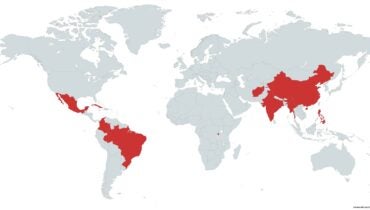After such a depressing week, I was especially happy to participate in an uplifting session at Civic Hall in Manhattan last Thursday night. We were brought together by Overture, a tech and humanitarian company dedicated to activating conversations about the development and support of technology solutions to help solve issues plaguing humanity. The session was part of Overture’s “Digital Humanitarian Series”, designed to foster strategic partnerships, dialogue, ideas, and eventual launch of tech services/products.
Around 150 energetic and passionate mainly young people, including many men, came together for a discussion with leaders from across the technology, humanitarian, and development worlds to explore how we can leverage technology to accelerate gender inclusion.
Hosted by Bertha Coombs of CNBC, I feel like we all came away inspired to ramp up our work to promote the rights and opportunities of women and girls.
I focused my remarks on highlights from the recent report of the High-Level Panel established by the Secretary General, which I co-authored with Professor Laura Tyson. The High Level Panel report reviews constraints and identifies actions that can be taken now by governments, businesses, non-profit organizations and multilateral development agencies to accelerate progress toward gender equality. The report is very much grounded in the 2030 Agenda for Sustainable Development, as gender equality and the empowerment of women and girls are central to achieving the Agenda’s overarching goal of inclusive growth, leaving no one behind.
Empowering women economically is not only the “right” thing to do to honour the world’s commitments to basic human rights. It is also the “smart “ thing to do for development, economic growth and business. Several recent studies confirm that the economic and human development costs of persistent economic gender gaps are significant. We show that across countries, higher levels of gender inequality are associated with higher levels of human development in education and health, higher levels of per capita income, faster and more inclusive economic growth, and stronger national competitiveness.
I talked about four overarching and interconnected constraints that impede gender equality in all forms of work and at all levels of development: adverse social norms; discriminatory laws and lack of legal protection; gender gaps in unpaid household work and care; and gender gaps in access to digital, financial and property assets. And these factors are inter-related – adverse norms contribute to large gender gaps in access to digital services—gaps that are largest among poor women in developing countries—as shown in the figure. In thinking about digital solutions and scale, affordability in many countries needs to be addressed, especially for low-income customers, through reduced pricing or free access.
The importance of social norms was a recurring theme through the evening. Dale Buscher, Senior Director at the Women’s Refugees Commission spoke powerfully to the need for a sea-change in thinking about humanitarian work – recognizing the scale and duration of the challenge, and the need to be thinking about solutions and step change, nor incremental improvements. Assuring girls’ access to education, and women’s access to economic opportunities, is a critical part of the puzzle.
A panel moderated by Jamie Palot, Co-Founder, Emblematic Group investigated these themes with experts in tech and development. Jeanne Jang, Director of the IBM Digital Innovation Lab in nearby Astor Place spoke to the ways in which diversity in the workplace is being actively pursued by IBM, under a female CEO. Sayo Martin, Head of Marketing, Global Innovation Center, Samsung Electronics underlined the scope for creativity and the ongoing search for new ideas—calling on participants to share their ideas. Fiona Bayat-Renoux from UN Women highlighted some of the way that development agencies are bringing technology to promote women’s opportunities in the field, including farmers in Rwanda.
It seems that many of the participants were engaged not only on technology development, but also actively undertaking outreach training and mentoring programs to improve women’s digital literacy in Africa, South Asia and elsewhere. For example, Andela:“We seamlessly integrate the top 1% of tech talent (from Africa) into your team.” Encouraging more women in tech is a core focus for Andela—with their first all-female developer cohort in March 2016. About 28% of Andela developers are women compared to a 5.8% globally (StackOverflow). Tech in Pink, founded by Andela developers Yetunde Sanni (from Nigeria) and Gertrude Nyenyeshi (from Kenya) aims to promote women in technology and teach young people to solve problems with code, and held their first coding session for women in Nairobi in May. Another well-known example that we cited in the High Level Panel report is #iamtheCODE, which seeks to enable 1 million young women coders through training and mentorship by 2030 in Africa.
Mobile telephones and digital platforms are already benefiting female entrepreneurs in multiple ways, including leveling the playing field for women by reducing the importance of traditional relationships for both accessing suppliers and customers. We can see this in China, with Taobao, and in the ways that, for example, in 2014 the IT firm Mindtree in Bangalore, India created a digital platform called “I Got Garbage”, which enables waste pickers to organize themselves into franchises and participate in online marketplaces, which roughly doubled waste pickers’ earnings.This again reminds us of the importance of closing gender and poverty gaps in access to digital services.
We all need to be thinking about ways in which technological innovation can be a tool to allow us to think big, bringing new actors and new ideas into the women, peace and security space. Digital approaches are perhaps one of the most promising ways that inclusion can be accelerated commensurate with the challenges that the world faces.
About the Author
Jeni Klugman joins the Institute as its Managing Director. Dr. Klugman brings 25 years of experience and a record of strategic leadership on gender, economics, law, global development and governance. From 2011-14 she served as the Director of Gender and Development at the World Bank where she set and shaped the Bank’s gender strategy. She is the author of many studies, and recently co-authored the UN Secretary General’s high level report on women’s economic empowerment, which was unveiled at the UN General Assembly last month. Dr. Klugman continues her affiliation with Harvard University, where she is a fellow at the Kennedy School of Government’s Women in Public Policy Program. Dr. Klugman’s academic experience includes serving as a research professor at the Elliot School of International Affairs, George Washington University and teaching at the Kennedy School, Johns Hopkins School of Advanced International Studies and Sydney University Law School. She holds a PhD from Australian National University as well as degrees from Oxford University and the University of Sydney. She was a Rhodes Scholar.




